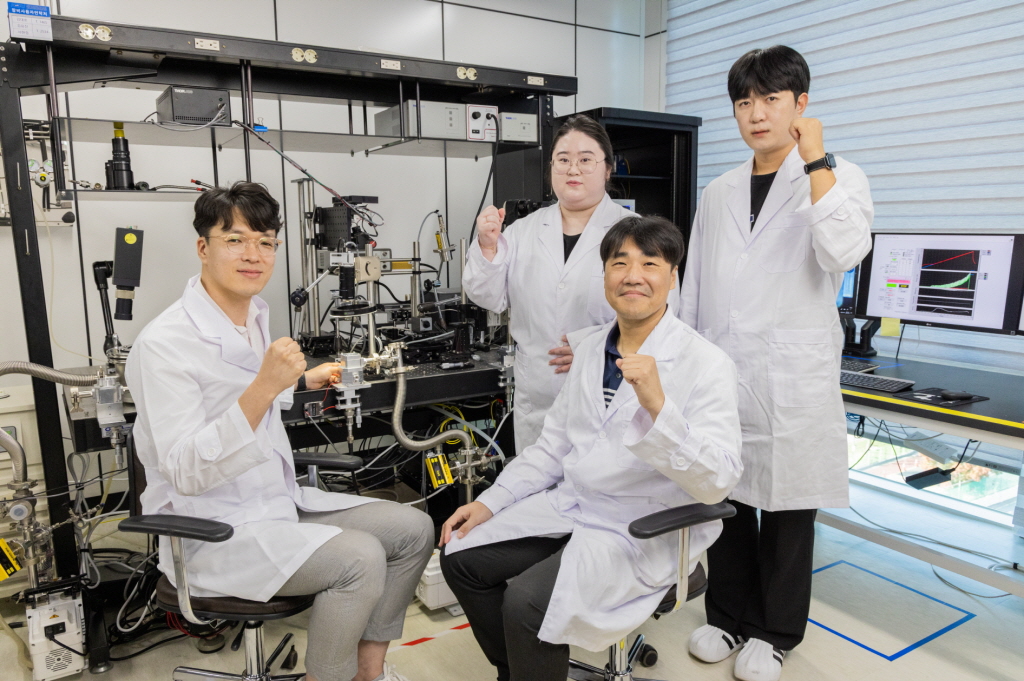한국전기연구원(KERI) 나노융합연구센터 김대호·박종환 박사팀이 전자레인지의 원리인 마이크로파 유도 가열 기술을 활용해 ‘나트륨 이온 전지’의 하드카본 음극을 30초 만에 신속 제조하는 획기적인 공정 기술을 개발했다.

▲(앞줄 왼쪽부터)KERI 김대호, 박종환 박사팀이 ‘마이크로파 유도 가열 기술’을 활용해 나트륨 이온 전지의 음극 소재인 ‘하드카본’을 신속 제조하는 공정 기술을 개발했다.
마이크로파 유도 가열, 화재 위험 적은 차세대 전지 기대
전자레인지 원리를 이용해 ‘나트륨 이온 전지’ 음극재를 빠르고 쉽게 제조할 수 있는 기술이 개발돼 향후 화재 위험성이 적은 차세대 전지 상용화가 기대된다.
한국전기연구원(KERI) 나노융합연구센터 김대호·박종환 박사팀이 전자레인지의 원리인 마이크로파 유도 가열 기술을 활용해 ‘나트륨 이온 전지’의 하드카본 음극을 30초 만에 신속 제조하는 획기적인 공정 기술을 개발했다고 7일 밝혔다.
차세대 이차전지 중 하나인 나트륨 이온 전지(sodium-ion Battery)는 현재 가장 많이 사용되는 리튬(Li)을 나트륨(Na)으로 대체한 것이다. 소금의 주성분인 나트륨은 매장량이 리튬의 1천 배 이상으로 많고, 채굴 및 제련도 쉽다. 또한 나트륨의 반응성이 리튬보다 낮아 전지 내부에서의 전기화학적 안정성이 높고, 고속 충·방전에 유리하며, 낮은 온도에서도 성능이 잘 유지된다는 장점이 있다.
반면에 나트륨 이온 전지는 제조 과정이 매우 까다로워 리튬이온전지 대비 에너지 밀도가 낮고, 수명이 길지 않다는 단점을 가지고 있다. 나트륨 이온은 리튬 이온보다 입자가 크기 때문에 기존 음극재인 흑연보다 층간 거리가 큰 하드 카본(hard carbon)이 활용된다.
하드 카본은 자연계에 존재하지 않아 인공적으로 만들어야 하는데, 그 과정이 매우 까다롭다. 식물 및 고분자의 주요 구성원인 탄화수소 재료를 공기가 통하지 않는 공간에서 섭씨 1,000도 이상의 고온으로 장시간 태워야만 하드 카본을 만들 수 있다. 일명 ‘탄화 공정’이 필요해 경제적·환경적으로 부담이 되고, 이는 곧 나트륨 이온 전지의 상용화를 막는 원인 중 하나였다.
이에 많은 연구진들이 노력을 기울이는 가운데, 김대호·박종환 박사팀은 전자레인지의 원리인 ‘마이크로파(Microwave)’를 활용해 급속 가열을 이용하는 방법을 제시했다. 먼저, 고분자 원료에 전기가 잘 통하는 신소재인 탄소나노튜브를 소량 섞어 필름을 만든다. 그리고 여기에 마이크로파 자기장을 가해주면 탄소나노튜브에 유도 전류가 발생하게 되고, 필름 소재만 30초 만에 선택적으로 1,400℃ 이상 고속 가열되는 원리다.
이미 KERI는 수년 간의 연구로 마이크로파 자기장을 활용해 금속 등 전도성 소재로 이루어진 박막을 균일하게 열처리하는 기술을 보유하고 있고, 디스플레이와 반도체 등 산업 공정에서 많은 주목을 받은 바 있다. 또한 연구원 나노융합연구센터는 탄소나노소재 분야 국내 최고 기술력을 보유한 곳이다. 김대호·박종환 박사팀은 이러한 역량을 활용해 나트륨 이온 전지 음극재라는 새로운 분야에 도전했고, 좋은 결과를 얻은 것이다.
핵심 기법은 연구진이 자체 개발한 ‘멀티피직스 시뮬레이션(Multiphysics Simulation)’이다. 이를 통해 마이크로파 대역의 전자기장이 나노소재에 가해질 때 일어나는 복잡한 과정을 근원적으로 이해하고, 나트륨 이온 전지 음극재를 제조하는 신개념 공정 방식을 창조해 낼 수 있었다. 관련 연구결과는 높은 평가를 받아 화학공학 분야 세계적 학술지인 ‘Chemical Engineering Journal(IF : 13.3, JCR 상위 3%)’에 논문이 최근 게재되기도 했다. 논문 게재에는 KERI에서 학연협동 과정을 수행했던 류경범·신지원 학생연구자가 공동 1저자로 함께했다.
KERI 박종환 박사는 “전기차 화재 사건 등으로 인해 안전하고, 추운 겨울철에도 잘 작동하는 나트륨 이온 전지가 주목받기도 했지만, 음극재를 만드는 탄화 공정이 에너지 효율이나 비용 측면에서 큰 열세였다”고 밝혔다.
김대호 박사는 “우리의 마이크로파 유도 가열 기술은 하드 카본을 빠르고 쉽게 제조할 수 있어 나트륨 이온 전지의 상용화에 크게 기여할 것”이라고 전했다.
향후 연구팀은 음극재의 성능을 높이기 위한 노력을 계속해 나갈 예정이며, 대면적의 하드 카본 필름을 연속적으로 대량 생산할 수 있는 기술도 개발한다는 목표다. 또한, 마이크로파 유도 가열이 고온 소성(sintering) 공정이 필요한 전고체전지 등 분야에도 활용될 수 있을 것이라 판단하여 기술의 활용 범위를 넓혀 나갈 예정이다.
국내 특허 출원까지 완료한 KERI는 이번 기술이 에너지 저장 소재 관련 기업들의 많은 관심을 받을 것이라 보고, 수요 기업을 발굴하여 기술이전을 추진한다는 계획이다.
한편 KERI는 과학기술정보통신부 국가과학기술연구회 산하 정부출연연구기관이다.
